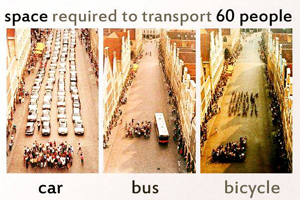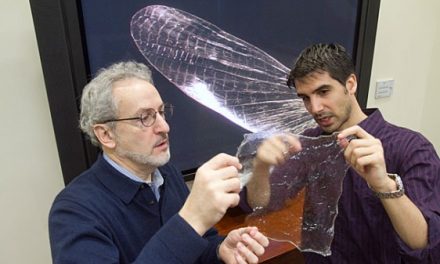Bicycling Could Save Billions – If people chose to take half of their car trips on two wheels instead of four, health care costs could drop by billions. Author, Emily Sohn
Compared to driving, bicycling is clearly better for the environment and your health. But how much better is it?
A new study offers some hard numbers: If people in the upper Midwest chose to take half of their car trips by bicycle, health care costs would drop by $7 billion. And with better air quality for its now more-fit citizens, the region would end up with an estimated 1,100 fewer deaths each year.
The study, which was the first to quantify the consequences of cycling instead of driving, should encourage communities to better support people on bikes.
“If you have a city with good biking infrastructure, the potential gain in health benefits compared to risks could be, like in Europe, quite significant,” said Jonathan Patz, a public health scientist at the University of Wisconsin, Madison. “Our study, which shows the incredible health benefits that are possible, gives that much more impetus to make our cities safer for biking.”
Scientists have already proven that cars pollute, that air pollution is bad for health and that cycling is good for us in many ways. To quantify the links, Patz and colleagues started by combining transportation survey data from the largest 11 cities in the Midwest with the best available air-quality and health models. Then, they started crunching numbers.
More than 31 million people live in the Great Lakes region, and like in the rest of the country, they primarily use their cars to get around. Eighty percent of trips taken in the region happen in automobiles, and 20 percent of those trips cover fewer than five miles total.
By eliminating the very short drives, the researchers report in the journal Environmental Health Perspectives, the region would see an annual savings of $3.5 billion in health costs. And about 400 fewer people would die each year. If just half of those short trips were taken by bicycle instead, savings would include an extra $3.8 billion and 700 lives.
The findings add to previous data on the benefits of bicycling, Patz said. One study, for example, compared America’s cities and found a 20 percent lower rate of both diabetes and obesity in the most bikeable places. Another study in Holland, which has tons of bicycling infrastructure, found that the benefits of cycling there were nine times greater than the risks from getting hit by cars or breathing in fumes.
With such striking numbers, the new study may make the intangible benefits of biking more real. For planners, the numbers support the need for communities to prioritize designated bike lanes, bike racks and other cycling infrastructure, said Howard Frumpkin, an environmental health specialist at the University of Washington School of Public Health in Seattle.
The results also serve as a wake-up call for commuters.
“To the average, everyday person, this is a reminder that switching from a car to a bike is an enormously healthy thing to do,” Frumpkin said. “And you not only get all those personal benefits, you improve air quality and reduce congestion on roads, and those are good for the whole community.”
Photo credit: Press-Office, City of Munster, Germany, 2001 The City of Munster, Germany











